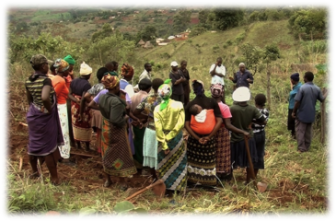An Open Letter to His Holiness Pope Francis, on the Occasion of His Visit to Michoacán, Mexico, Winter Sanctuary of the Monarch Butterfly
February 16, 2016
Contact:
Ercilia Sahores, ercilia@organicconsumers.org, +52 (55) 6257 7901
Endorsed by Bipartisan Faith-Based, Indigenous, Environmental, Natural Health, Justice, Consumer and Farming Groups.
We welcome you and your message of “climate as the common good” to our country. We urge world leaders and ordinary citizens to honor your call to “hear both the cry of the earth and the cry of the poor.” And to heed your advice to “adopt clear and firm measures in support of small producers” in order to address the ethical, economic, and environmental crises confronting humanity.
In Mexico, the center of origin of maize, nearly 60 varieties of this staple grain and hundreds of its subfamilies are at risk of extinction due to profit-driven corporations seeking to cultivate genetically modified (GMO) corn across Mexico. In 2013, the people responded by filing a civil lawsuit headed by 53 individuals from the scientific, farming, indigenous, consumer, artistic and environmental communities, as well as 20 nonprofit organizations.
For centuries, small farmers in Mexico cultivated their maize according to a regenerative agroecological farming system called the milpa. This proven system integrates a diverse variety of grains, pulses and vegetables, providing foundation for a healthy diet while simultaneously building soil fertility and supporting agrobiodiversity. We respectfully ask for your continued support in protecting regenerative organic food systems like the milpa, and the rights of “Every campesino…to possess a reasonable allotment of land where he can establish his home, work for subsistence of his family and a secure life.”
In order to protect small farmers, we must first acknowledge the connections between food, farming and climate change. As the largest source of global greenhouse gas emissions, the agriculture industry must be reformed in order fix the climate crisis.[1] According to the UN, a global transition from industrial agriculture to local ecological agriculture offers our best chance at mitigating the impacts of climate change on food security.[2] As you so aptly put it, “Climate change is a moral issue.” And we also humbly suggest that a global transition to regenerative agroecological food systems is an equally important moral issue.
In this country, as in so many others, the global spread of industrial agriculture and its use of petroleum-based fertilizers, agrotoxins and GMOs has devastated the health, biodiversity and sacred beauty of the world. A clear example of this devastation can be seen here in the state of Michoacán, winter sanctuary of the monarch butterfly. Over the past two decades, monarch populations have declined by 90 percent due primarily to the use of the herbicide glyphosate in Roundup Ready GMO crops, illegal logging and habitat loss.[3] Tragically, the few monarchs remaining may face an even greater challenge in the future; scientists indicate that rising temperatures due to climate change threaten to damage more than 70 percent of the monarch’s remaining winter habitat by the end of the century.[4] Fortunately, research has shown that regenerative organic systems can help to reverse rising temperatures by sequestering billions of tons of annual CO2 emissions back into the soil, while restoring agrobiodiversity (Rodale, 2014)[5].
We share your conviction that everything in the world is connected, and that to seek “only a technical remedy to each environmental problem which comes up is to separate what is in reality interconnected and to mask the true and deepest problems of the global system.”
As world leaders prepare to gather here in Mexico for the COP13 Convention On Biodiversity in December, we ask you to continue to speak out about the role that industrial agriculture has played in destroying our soil, health and biodiversity, even as it has failed to alleviate world hunger.
There is a solution to food insecurity, climate change and biodiversity loss. We must opt for regenerative organic agriculture. The urgency of this problem demands that we join forces and work together to achieve change. We thank you for your courage and your commitment to the world’s poorest, and we accept your challenge to approach these complex crises by seeking solutions that not only protect nature, but also combat poverty and restore dignity to the excluded.
Sincerely,
La Asociación de Consumidores Orgánicos
Endorsing Groups:
Agua para la Vida, México
Agua para Tod@s, México
Anec, México
Asia Pacific Network for Food Sovereignty (APNFS), Philippines
Becket Films, USA
Beyond GM, United Kingdom
Beyond Pesticides Network Canada, Canada
Biodentistry, México
Biodiversity for a Liveable Climate, USA
Bosque Sustentable AC, México
Carnaval del Maíz, México
Cedar Circle Farm, USA
Center for Sustainable Medicine, USA
Centro de Derechos Humanos Fray Francisco de Vitoria, México
Centro de la Tierra, México
CILAS, México
Circle Squared Foundation, The Netherlands
COBOSPO, México
Colectivo Zacahitzco, México
Colectivo Zócalo, México
Comunidades Campesinas y Urbanas, México
Cool Planet, USA
Dr. Pablo Jaramillo López, Ph.D. UNAM, (National Autonomous University of Mexico), México
FAT, México
Favianna Rodriguez Artist, USA
FIAN, México
Fundación Semillas de Vida AC, México
GEA, México
GMO Inside, USA
Greenpeace Mexico, México
Grupo Ecologico Sierra Gorda IAP, México
Grupo Vicente Gutierrez, Tlaxcala, México
Guereni Vendie, México
Kids Right to Know, Canada
Kiss the Ground, USA
LATINDADD, México
MAELA México, México
MaOGM, México
Milliones Against Monsanto, USA
Millones Contra Monsanto, México
NTC-SME, México
Nutiva, USA
Organic Consumers Association, USA
Pasticultores del Desierto, AC, México
People’s Lobby, USA
Programa Ambiental de la Universidad Autónoma de Chapingo, México
Rainman Landcare Foundation, South Africa
RASA, México
Red Nacional de Género y Economía, México
Reg Maíz, México
Regeneration International, USA
RMALC, México
Shumei International, Japan
Sin Maíz No Hay País, México
SME, México
Spiral Farm House, Nepal
STUNAM, México
SUEUM, Michoacán, México
The Hummingbird Project, USA
The Rules, USA
UCCS, México
Valhalla Movement, Canada
Vía Orgánica AC, México
Viva Sierra Gorda, México
El Maíz Más Pequeño AC, México
Caminos de Agua AC, Mexico
[1] https://unctad.org/en/PublicationsLibrary/ditcted2012d3_en.pdf
[2] https://www.ohchr.org/EN/NewsEvents/Pages/DisplayNews.aspx?LangID=E&NewsID=16702
[3] https://news.nationalgeographic.com/news/2014/10/141010-monarch-butterfly-migration-threatened-plan/
[4] https://e360.yale.edu/feature/to_protect_monarch_butterfly_a_plan_to_save_the_sacred_firs/2942/
[5] https://rodaleinstitute.org/assets/RegenOrgAgricultureAndClimateChange_20140418.pdf

